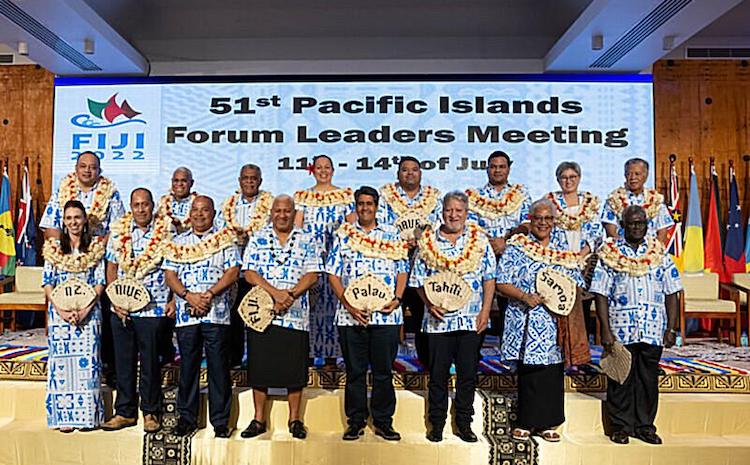Pledge to Promote “Accountable” Development
By Sera Tikotikovatu-Sefeti
SUVA, Fiji (IDN) — The leaders of the Pacific gathering for the first time in three years endorsed the 2050 Strategy for a Blue Pacific at the 51st Pacific Island Forum (PIF) from July 11 to July 14.
“The success of this strategy is down to two things, and that is first, the leaders take accountability, and secondly, the people also be accountable for it, ” said Fiji’s Prime Minister Josaia Voreqe Bainimarama, who chaired the PIF meeting. INDONESIAN | JAPANESE | THAI
The strategy focuses on seven key thematic areas: political leadership and regionalism, people-centred development, peace and security, resources and economic development, climate change and disasters, ocean and environment, and finally, technology and connectivity.
The strategy took almost three years of planning and engagement with various stakeholders, including civil society organisations across the region, taking part in the process. This carefully laid out strategy highlighted some key areas of concern and implementation guidelines to ensure it trickles down to society.
The term “regionalism” was used often during the event addressing the geopolitical presence of foreign countries and other pressing issues requiring a united front across the region from Pacific leaders.
“The retreat is the perfect opportunity for us leaders to discuss, debate, and find a solution to pressing issues that otherwise cannot be discussed publicly,” said Samoan Prime Minister Fiame Naomi Mataáfa reflecting on the importance of face-to-face dialogue.
Engagement of Civil Society
<Photo: French Polynesia Vice President – Jean Christophe Bouissou (left), Pacific Islands Forum Secretary General Henry Puna (centre) and New Zealand Prime Minister Jacinda Arden(right) enjoy a light moment after the presentation of the final communique of the PIF summit. Credit: Sera Tikotikovatu-Sefeti.
According to the Pacific Islands Association of Non-governmental Organizations (PIANGO) Deputy Executive Director, Josaia Osbourne, the civil society organisations’ community members were engaged during the planning phase of the strategy. “We have been included in the discussion for the past three years, and we have high hope that the strategy can work if we all work together,” he told IDN.
Osbourne sees it as a positive sign when people involved with the community are given room on the decision table to voice their concerns and suggestions to ensure any plans trickle down to the community members.
At the launch of the 2050 Strategy of the Blue Pacific Continent, Bainimarama said, “It is a matter of precedent, and it is certainly about our future.” It is how we work together as communities, as countries, or as one Blue Pacific continent. “The 2050 strategy is about what we share in common, our challenges and our opportunities,” he added.
The strategic people-driven approach has a comprehensive plan to ensure that the proposed (now endorsed) strategy can be relatable to work already in place on the ground. It looks at the present situation around the thematic areas to see what initiatives, plans, issues, and solutions are currently in place. This is followed by the six strategic pathways: partnership and cooperation; resilience and wellbeing; education; research and technology; inclusions; and equity and governance. Finally, it will look at the level of ambition expected from each thematic area.
The regionalism advisor for the Pacific Islands Forum, Joel Nilon, emphasised that at the heart of these thematic areas is the ocean and that we live surrounded by the blue Pacific Ocean.
“The 2050 strategy for the Blue Pacific continent was born out of the need for us to take a more strategic and long-term response to challenges in the environment around us,” Nilon told IDN.
“It is in response to the leaders’ call in 2019 for the strategy to be developed in response to climate change and existing challenges, as well as the intensification of geopolitical rivalry in our region,” he added.
According to Nilon, non-state actors such as regional international civil society, the private sector, and members of CROP (Council of Regional Organisation of the Pacific) agencies have helped guide the strategy’s development.
This new people-centred approach could be the answer to ensuring that each member involved in the drafting of the strategy will take ownership and ensure that its implementation is enforced and monitored. Thus, according to the General Secretary of the Pacific Conference of Churches, the Rev. James Bhagwan, “it’s incredibly important for us that this strategy works. It’s the first time we’ve been involved in this, and we know that it can only be a success if everyone works together and plays their part”.
Nilon echoed this message. “It is important that we come together and work more closely together,” he argues. “We have our numerous strengths; our people, our youth, our cultures offer us natural resilience and social protection, and we have significant natural resources.”
The 2050 Strategy of the Blue Pacific continent was endorsed and fully supported by the regional leaders, and various non-state actors are already planning the implementation to ensure its success.
“And within this context, we need a long-term strategic approach to guide how we work together, how we cooperate as countries, and, of course, how we interact with the outside world,” Nilon says. [IDN-InDepthNews – 22 July 2022]
Photo: The Group of Summit leaders. Credit: Sera Tikotikovatu-Sefeti.




